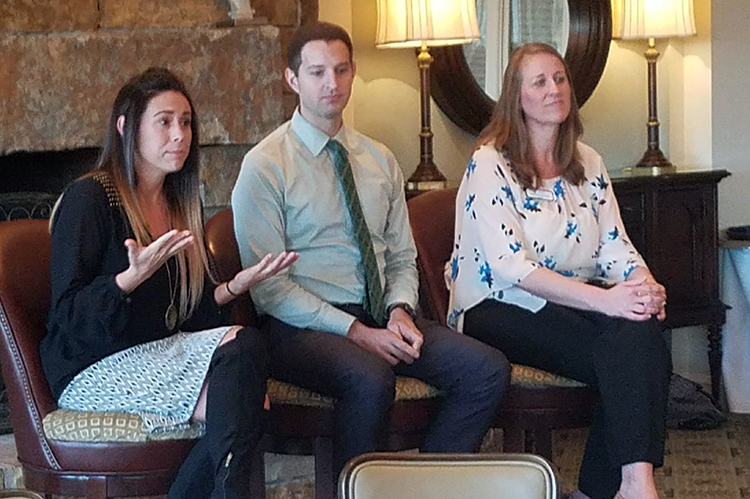
Kristen Maxwell, Michael Harman and Deanna Arnold
By Kate Stevens. Without many of the same resources to fight sexual harassment in the workplace as large corporations, small-business owners need to be aware of the type of work environment they are creating for their employees and have harassment policies already in place to handle problems if they arise.
That’s according to three experts who spoke about sexual harassment the workplace at a Newsmakers Breakfast at The Peninsula Club.
The topic is an important one, although sometimes uncomfortable, said Deanna Arnold, a human resource consultant and founder of Cornelius-based Employers Advantage.
“We just want to create awareness,” said Arnold. “It’s not to scare anybody or call anybody out. It doesn’t have to be a bad thing. It’s about awareness and being mindful of the workplace and people’s diversity and their cultures.”
The subject of sexual harassment is a timely one after high-ranking men in an array of high-profile positions have been accused of sexual harassment, improper behavior with subordinates—and even assault.
Although seemingly a new trend, human resource experts have been dealing with the issue of sexual harassment for decades, Arnold said.
Sexual harassment is a form of sex discrimination that violates Title VII of the Civil Rights Act of 1964, according to the U.S. Equal Employment Opportunity Commission.
Title VII applies to employers with 15 or more employers, including state and local government, the federal government, labor organizations and employment agencies, according to the EEOC.
One definition of sexual harassment is unwelcome conduct that affects an individual’s employment, unreasonably interferes with an individual’s work performance, or creates an intimidating, hostile or offensive work environment, said Michael Harman, a labor attorney in Huntersville.
The other definition conditions employment on the return of sexual favors.
When an employee feels he or she has been the victim of unlawful discrimination, including sexual harassment in the workplace, that employee has 180 days from the time of the alleged discriminatory act to file a charge with the EEOC, said Harman.
A sexual harassment charge is different from some of assault claims occurring outside the workplace that the public has seen in the news lately that are alleged to have happened many years ago, Harman said.
In a sexual harassment charge, the Title VII law won’t look at specific incidents of harassment, Harman said.
Instead, judges “look at totality of the circumstances,” which means judges will take into account all available information and not just the specific claim, he said.
Case law has evolved over the years so that actions that are considered sexual harassment today were not considered sexual harassment 30, 20 or even 10 years ago, Harman said.
As simple a gesture as a hug can have different meanings in a workplace, the experts said.
“There is a difference in hugging in a respectful work environment and hugging in a hostile work environment,” said Arnold. “You as a business owner or manager or leader, have to make sure you’re creating a respectful work place, across the board. If it’s the culture of the organization to be open and friendly, that doesn’t mean its harassing, right? But if you’re in more of a hostile work environment where it is common practice for jokes or inappropriate touching, if you’re hugging somebody innocently, that’s going to be perceived as more crossing the line into harassment.”
Arnold said the biggest challenge is making sure you’re creating a culture that is respectful and is open to communication if people do feel uncomfortable.
Employees need to be able to feel comfortable to raise concerns to you as manager or business owner or leader.”
After all, many people who feel they are sexually harassed may not want to file a lawsuit, Arnold said. Instead, they just want the questionable behavior to stop.
It’s all about the training small businesses implement and the policies and precedents that are set for when sexual harassment incidents do come up, said Kristen Maxwell, human resources director for Aquesta Bank and Insurance.
After all, small businesses and individuals are “highly susceptible, to sexual harassment claims because they don’t have the same resources, like having a human resources department, that larger corporations do, said Harman.
Sexual harassment training seminars should be held annually and if the company is too small to have a human resources department, the company can hire outside human resource experts to come to the company for presentations, said Maxwell.
“The policy is one of the biggest things you can do and is what comes up in litigation when you’re in court,” said Harman.
A small business needs a policy that clearly states the definition of sexual harassment and one that gives multiple avenues of reporting that harassment to not just a supervisor, but a human resource officer or even the CEO, Harman said.
Any claim of sexual harassment should be taken seriously and followed up by interviews and documentation, Maxwell said.
“At the end of the day, we as employers have to answer to a judge if they do file a claim,” said Maxwell.
Sponsors for the event were Aquesta Bank, Realtor Dixie Dean, Donna Moffett Accountants and Consultants, Davidson Wealth Management, G Brokerage and Master Title.




